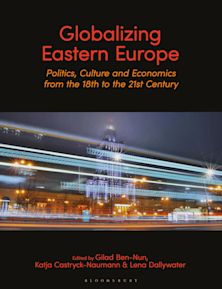Central and East European Politics
Changes and Challenges
Zsuzsa Csergo (Volume Editor) , Paula M. Pickering (Volume Editor) , Jennie L. Schulze (Volume Editor)
- Textbook
Central and East European Politics
Changes and Challenges
Zsuzsa Csergo (Volume Editor) , Paula M. Pickering (Volume Editor) , Jennie L. Schulze (Volume Editor)
- Textbook
Description
Clear and comprehensive, the 6th edition of Central and East European Politics: Changes and Challenges offers an authoritative and up-to-date analysis of the transformations and realities in Central and Eastern Europe, the Baltics, and Ukraine.
Featuring a set of comparative country case studies as well as thematic chapters on key issues, this new edition includes updates surrounding the effects of Russia's full-scale invasion of Ukraine on politics across the region, the rise of new centers of power for the region, and the continued challenges of sustainable democratic governance following the rise of influence in populism and illiberal political movements.
Table of Contents
1 Central and East Europe: Turbulent Histories, Dramatic Transformations, and Twenty-First Century Challenges
Zsuzsa Csergo, Paula M. Pickering, and Jennie L. Schulze
Part II: Policies and Issues
2 Liberal, Fascist, and Communist Legacies
Jeffrey Kopstein
3 Economic Reforms and Trends
Sharon Fisher and John Gould
4 Nationalism and Its Challenges to Democratic Governance
Zsuzsa Csergo and Jason Wittenberg
5 Civil Society and Political Parties: Growth and Change in the Organizations Linking People and Power
Kevin Deegan-Krause
6 Demography and Migration
Michelle Kelso and Daina Eglitis
7 Transitional Justice and Memory
Vello Pettai and Eva-Clarita Onken Pettai
8 Gender Regimes
Éva Fodor
9 The EU and Its Newer Members: Still The 'Lands Between'?
Ronald H. Linden
10 Russia Resurgent: Soft and Hard Power Challenges to Security
Jennie L. Schulze
Part III: Case Studies
11 Poland
Jane L. Curry
12 The Czech and Slovak Republics
Sharon L. Wolchik
13 Hungary
Ognen Vangelov and Federigo Argentieri
14 The Baltics
Daunis Auers
15 Bulgaria
Petia Kostadinova and Maria Popova
16 Romania
Monica Ciobanu and Mihaela Serban
17 Albania
Arolda Elbasani and Seimir Elbasani
18 Former Yugoslavia and Its Successors
Paula M. Pickering and Jelena Subotic
19 Ukraine
Paul D'Anieri
Part IV: Conclusion
20 Changes and Challenges: Three Questions
Zsuzsa Csergo, Paula M. Pickering, and Jennie L. Schulze
Product details

| Published | 11 Dec 2025 |
|---|---|
| Format | Ebook (Epub & Mobi) |
| Edition | 6th |
| Extent | 648 |
| ISBN | 9781538198919 |
| Imprint | Bloomsbury Academic |
| Illustrations | 50 b/w photos; 20 maps; 20 tables |
| Publisher | Bloomsbury Publishing |
Reviews

ONLINE RESOURCES
Bloomsbury Collections
This book is available on Bloomsbury Collections where your library has access.


































